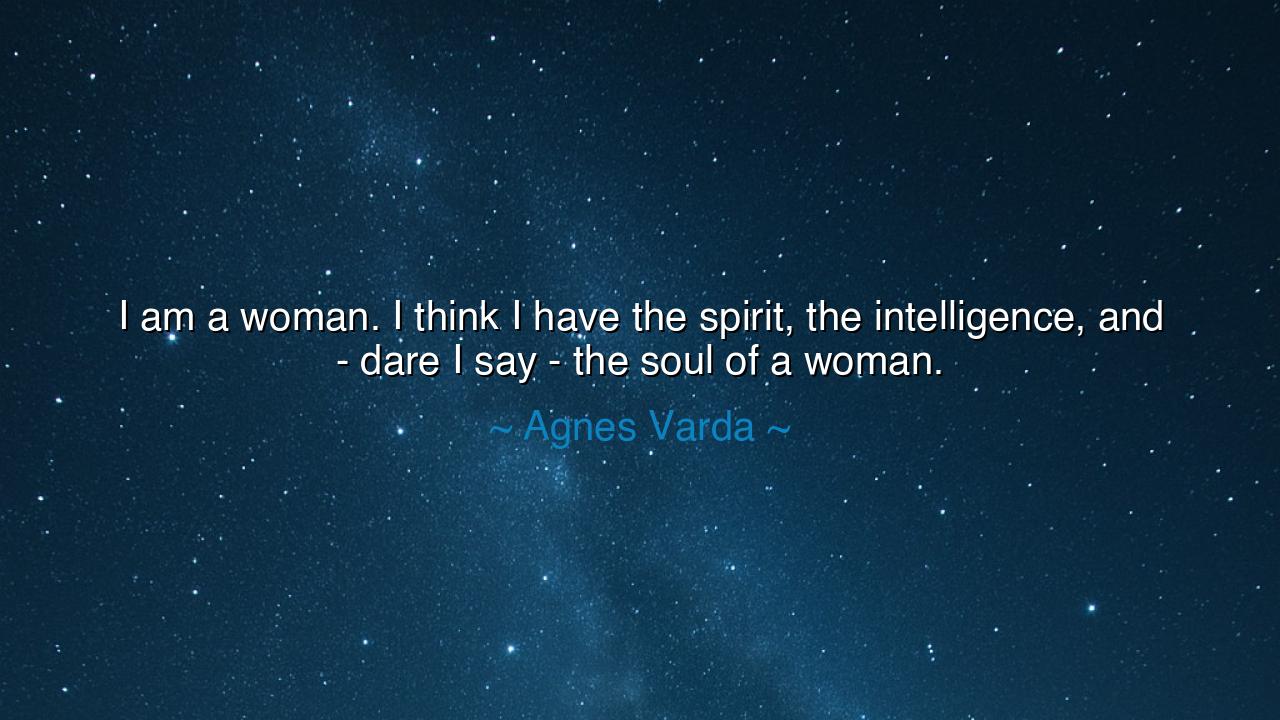
I am a woman. I think I have the spirit, the intelligence, and -
I am a woman. I think I have the spirit, the intelligence, and - dare I say - the soul of a woman.






“I am a woman. I think I have the spirit, the intelligence, and — dare I say — the soul of a woman.” Thus spoke Agnès Varda, the luminous matriarch of French cinema, whose voice carried both tenderness and defiance. Her words are not a boast but a declaration of being, a hymn of identity sung against centuries that sought to define womanhood from without. In this single sentence, Varda gathers the essence of what it means to be whole — spirit, intelligence, and soul — and claims them all, not as gifts granted by others, but as truths inherent in her existence. She speaks not only for herself but for all women who have had to reclaim their right to name their own humanity.
To understand this quote, one must know Agnès Varda, who stood as both artist and philosopher. She belonged to the French New Wave, an era dominated by men — by voices that celebrated the image of woman but rarely her interior world. Yet Varda moved differently; she filmed not from the gaze of others, but from within her own truth. Her camera became the eye of empathy. Through her films, she gave life to the quiet, the overlooked, the everyday — the spirit of womanhood itself, alive in struggle and grace. When she says she has the “soul of a woman,” she means that her art is not an imitation, but a manifestation of authenticity, of feeling and thought intertwined like root and flower.
Her words are also an answer to a long history of erasure. For centuries, the world’s philosophers, poets, and rulers debated what a woman was — but they rarely asked women themselves. Their definitions were made of shadow and silence. Yet Varda’s declaration shatters that silence. In naming her intelligence, she confronts the ancient lie that reason is the province of men; in naming her spirit, she affirms that courage and creation dwell in the female form; and in naming her soul, she restores to womanhood its sacred and infinite depth. She speaks as one who knows that being a woman is not a category, but a cosmos.
Consider the story of Joan of Arc, another woman of France, who centuries before Varda stood unyielding before kings and soldiers. She too possessed the spirit and soul of a woman — fierce yet faithful, intuitive yet resolute. She led armies not with brute strength, but with conviction that transcended her time. Like Varda, she embodied the paradox of softness and strength, of intuition and intellect united. And though the world punished her for her defiance, her voice outlived the flames. Both Joan and Agnès remind us: to be a woman is not to be lesser — it is to carry within oneself the full mystery of creation and endurance.
Varda’s declaration also challenges a modern misconception: that the essence of identity is defined only through struggle. She does not define womanhood by opposition, but by presence. Her tone is calm, even joyful. To say, “I have the soul of a woman,” is to claim peace with oneself — to inhabit one’s nature with pride, not apology. There is power in her serenity, for she teaches that the highest form of rebellion is self-acceptance. A woman who knows her worth, who lives her truth without seeking permission, becomes unstoppable. Her existence itself becomes an act of revolution.
In this, Varda speaks to all who seek to understand their own essence — not only women, but all souls divided by expectation. She reminds us that identity is not performance; it is authenticity lived daily, in word and deed. Whether one creates art, raises children, teaches, or builds, what gives these acts meaning is the spirit poured into them. Her life was proof: each film she made, each story she told, was an offering from her own soul. Passion was her brush; truth was her canvas. Through her art, she showed that the soul of womanhood is not one thing — it is multiplicity, reflection, and boundless imagination.
Therefore, my children of wisdom, learn from the words of Agnès Varda. Do not let others define the spirit within you. Know your own intelligence — not as comparison, but as expression. Let your soul speak in the work of your hands, in the honesty of your art, in the kindness of your strength. To say, “I am,” as Varda did, is to honor the divine spark that dwells in all human beings, but especially in those who have been told to be silent. The world needs your soul, your spirit, your intelligence — not as they are prescribed, but as they are truly lived.
And so, carry this lesson: to be yourself — wholly, fearlessly, tenderly — is the greatest act of creation. For the world may doubt, but the spirit endures; the mind expands; and the soul, once awakened, illuminates the darkness around it. Thus, as Varda did, declare it proudly: “I am a woman.” And in those words, you do not merely speak — you ascend.






AAdministratorAdministrator
Welcome, honored guests. Please leave a comment, we will respond soon